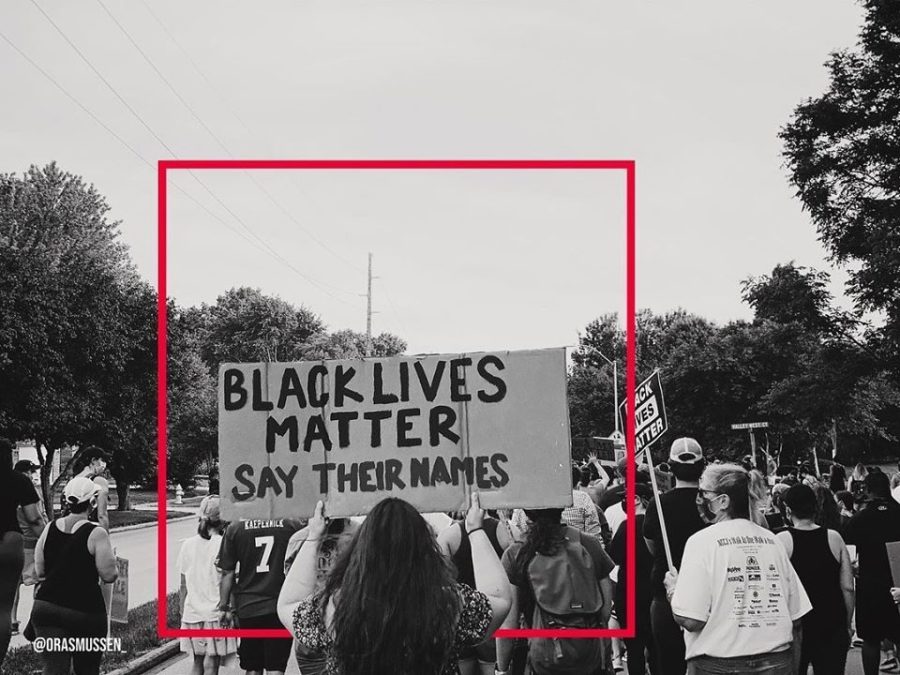First Amendment Days to focus on protests and the right to assemble
A Black Lives Matter protest and march in West Des Moines, Iowa, following the killing of George Floyd by former Minneapolis police officer Derek Chauvin.
April 11, 2021
The Greenlee School of Journalism and Communication will host First Amendment Days on Monday through Friday.
First Amendment Days is organized by the First Amendment Committee at Iowa State and is the longest-running continual student-led First Amendment celebration at any university in the U.S., according to the Greenlee website.
This year, all events will be virtual, and the theme is “Some Assembly Required.” All events are free and open to the public. The goal of First Amendment Days is to educate the Iowa State community about their five freedoms of speech, press, petition, assembly and religion.
The focus of protests was originally planned for the 2020 celebration but was postponed due to the pandemic. Julie Roosa, chair of the committee and adjunct assistant professor in the Greenlee School, said in a media release that a year later, the theme is still relevant.
Roosa serves as the First Amendment specialist for the Greenlee School of Journalism, and she said the First Amendment Committee has talked about bringing some of these speakers to campus for almost two years.
In the past, First Amendment Days examined all five of the freedoms of the First Amendment, but Roosa said oftentimes, the focus has been on freedom of speech more than the others.
“We thought the idea of gathering to peaceably assemble was one we hadn’t spent much time or focus on,” Roosa said. “That was even before the protests began sweeping the nations, so this year, it is even more perfectly in time.”
Panelist Andrea Sahouri is a reporter for the Des Moines Register with a focus on social justice issues. During Black Lives Matter protests over the summer in 2020, Sahouri was zip-tied and pepper-sprayed in the face at close range by a Des Moines police officer.
The first thing Sahouri remembers from that day was the pain from the mace in her eyes.
“The pain was unreal, I remember thinking I was going to go blind,” Sahouri said.
Numerous times, Sahouri identified herself as a Des Moines Register journalist to the officer, and other journalists around her confirmed her identification. Sahouri was still in reporter mode during her arrest.
“I was a reporter being arrested, and I knew this was serious,” Sahouri said. “People don’t think this happens in the United States, but it does. So immediately, when I was able to, I kind of just started reporting again.”
Sahouri used her phone to record a livestream while she was in the van of the police van to report what happened to her.
Roosa said it is important for students to know their First Amendment rights because sometimes, they are viewed as a guarantee in the United States.
“It makes sense to focus our efforts on the campus and invite students to actually practice these First Amendment rights we have,” Roosa said. “Sometimes, we can take them for granted and also maybe we don’t talk advantage of exercising those rights.”
The officer who arrested Sahouri did not turn on his body camera during the arrest.
“I could sense the urgency, so that just made me want to report what was going on,” Sahouri said.
Since her arrest, Sahouri continued to do her job as a reporter and cover the protests over the summer. After, Sahouri continued to cover the protests, but it was anxiety-inducing for her, and she now fears more for her safety on and off the job.
“It was very hard to do my job, and there were days it was just hard to get out of bed,” Sahouri said.
Sahouri faced charges for 10 months before her trial. During that time, she experienced support from not only communities in Iowa but throughout the world to help get her through the traumatic days. Regardless, Sahouri won’t let anyone tell her how to do her job.
When covering protests, Sahouri recommends student journalists to do a risk assessment to know how to identify as the press and be prepared for what might happen.
“My trial should not detour journalists from covering protests; it is essential and crucial for democracy,” Sahouri said. “We have a very, very crucial role to play, and I think that especially student journalists shouldn’t forget that, but at the same time, take safety seriously.”
Schedule for First Amendment Days
Monday
-
12 p.m.: Monday Monologue: The Power of Peaceful Protest
-
5:30 p.m.: The First Amendment and the Civil Rights Movement: Out History, Our Present, Our Future – Gene Policinski and Robert Bickel
Tuesday
-
1 p.m.: Student Panel: First Amendment, Student Activism and Campus Climate
-
7 p.m.: Signs of Resistance: A Visual History of Protest in America – Bonnie Sigler
Wednesday
-
10 to 11 a.m.: Signs of the Times Protest Art Workshop
-
12 to 1 p.m.: Art of Resistance at Iowa State: A Virtual Exploration
-
7 p.m.: Hate: Why We Should Resist It with Free Speech, Not Censorship – Nadine Strossen
Thursday
-
11 to 11:50 a.m.: Activism in the Music Industry: An ISCORE Encore Presentation
-
12 to 1 p.m.: Think Like a Journalist: Arrested on the Job – Andrea Sahouri, Des Moines Register
-
1:10 to 2 p.m.: A Protest is Worth 1,000 Pictures – Michael Englud
-
2:10 to 3 p.m.: When Objectivity Stops – Will Fowler
Friday
-
9 to 9:50 a.m.: Session 1- You Can’t Say that! Cancel Culture and the First Amendment
-
10 to 10:50 a.m.: Session 2- Free Assembly in the Time of Polarization
-
11 to 11:50 a.m.: Session 3- Making Free Speech an Ally on Campus







